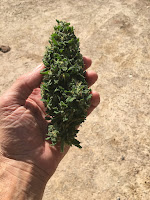Washington and Nevada are the best states for cooperating with tribal communities planting the seeds of cannabis economic development according to another industry expert.
While functioning much like a traditional association, Oatman herself is a strong proponent for tribes exerting their sovereignty. She also sees the positive link to what happened with Indian gaming. States, however, have been very predatory with regard to cannabis, putting up regulatory walls wherever possible, right down to water rights. Worse, she said, “there is no deference to tribal sovereignty,” and tribal consultation is not taking place. “States keep us out of all markets, not just cannabis,” she lamented.
“A tribe must be really committed from concept to completion,” Tall Bear said. That includes tribal capacity to actually build a business that has more and more diverse regulations to deal with than gaming. He also sees cannabis replacing gaming as a form of entertainment as tribes age out. Although that adds a layer of regulation, in the meantime, tribes could pursue something similar to the Indian Gaming Regulatory Act of 1988. Waiting to get into the cannabis market only makes it less profitable for tribes in the long run, according to Tall Bear. Get in now and grow, is his battle cry. [Indian Country Today]Under the 1988 Indian Gaming Regulatory Act the Tohono O’odham Nation won its lawsuit with the State of Arizona and in 2017 it opened a casino in Glendale outside its established boundaries. So, in 2018 the Oglala Lakota Oyate bought fifty acres just off I-90 outside their Nation then legalized cannabis for all adults in 2020. According to the Lakota Times Oglala Lakota College has the equipment to test cannabis.
Working in conjunction with the University of Idaho College of Law, Professor Mark Cowan, J.D. is Director of the Accountancy-Taxation Program at Boise State University where his research interests include the taxation of nonprofits and tax issues in Indian Country.
The current law surrounding the cannabis industry is uncertain. Tax is just one part of this complicated puzzle. Until the federal government acts, the states, the tribes, and the industry must bear the burden of these complexities with as much grace as possible. Since we are at an early stage, now is an opportune time for the three sovereigns to coordinate their efforts and level the tax playing field between on and off reservation sellers. States or tribes should not try to exploit an often ambiguous, unfair, and multi-sovereign tax structure to their advantage. Instead, they should work with their fellow sovereigns to develop a fair and certain tax framework that will allow the cannabis industry to grow. The best strategy for the cannabis industry, including the tribal cannabis industry, is to support these efforts. It is the industry’s stability and growth, fostered by a clear and fair tax system, which—through increased economic development and additional tax revenue—will benefit all the governments involved over the long term. Tax disparities—like cannabis itself—might temporarily alleviate some symptoms, but they won’t cure the underlying ailments. [Cowan, Taxing Cannabis on the Reservation]Trapped in North Carolina the Eastern Band of Cherokee Indians hopes to be the next tribal community to market retail cannabis.

1 comment:
"On Wednesday, the Minnesota Court of Appeals heard oral arguments in State of Minnesota v. Todd Jeremy Thompson, a case that could affect how a longstanding public law applies to cannabis in Indian Country. Mary Jane Oatman, executive director of business advocacy group the Indigenous Cannabis Industry Association, said Public Law 280 has caused issues for aspiring Native business owners in the sector already - including her. 'You get a local sheriff who's hellbent on watching anyone coming into their county with marijuana - that's a risk,' Oatman said." Tribal Business News
Post a Comment